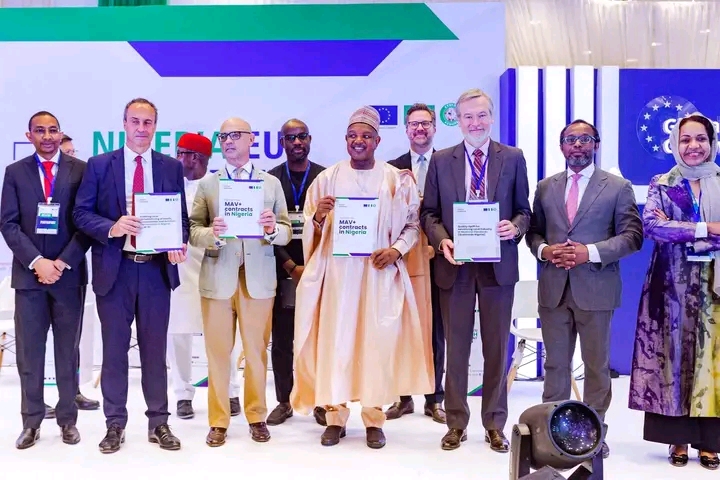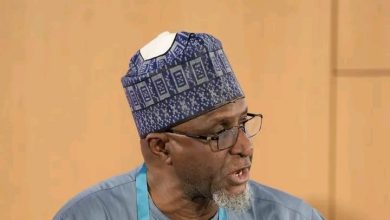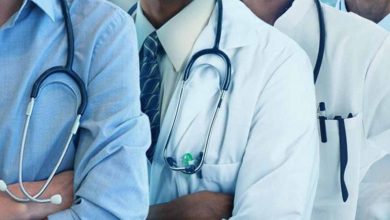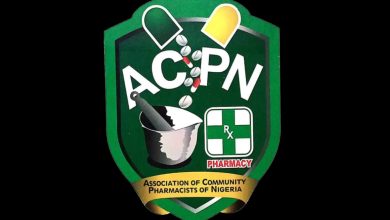Nigeria, EU Sign Major Agreements To Boost Local Manufacturing And Health Investments
Nigeria has signed three major partnership deals with the EU and ECOWAS to boost local drug production and healthcare.
The agreements aim to strengthen manufacturing, investment, and regional health systems.
The Federal Government of Nigeria has signed three key partnership agreements with the European Union (EU) and the Economic Community of West African States (ECOWAS) to strengthen local manufacturing, attract investments, and improve healthcare delivery in Nigeria and across West Africa.

The agreements were signed on Thursday at the Nigeria–EU Health Investment Forum in Abuja as part of the EU’s Global Gateway Manufacturing and Access to Vaccines, Medicines and Health Technologies (MAV+) and Sexual and Reproductive Health and Rights (SRHR) initiatives.
They include the Enabling Local Manufacturing of Health, Immunization and Nutrition Commodities in Nigeria (ELM-N), which aims to boost domestic vaccine and medicine production; Quality Uplift for Advancing Local Industry in Medicine Standards (Qualimeds Nigeria), focused on improving drug quality and regulatory systems; and Strengthening SRHR in West Africa, designed to advance reproductive health and rights across the region.
Strengthening Nigeria’s health sector
He noted that President Bola Tinubu’s Executive Order promoting local production of pharmaceuticals and medical devices marked a significant step toward health sector reform.
“Through the Presidential Initiative for Unlocking the Healthcare Value Chain (PVAC) and complementary frameworks such as the Sector-Wide Approach (SWAp), this administration has taken concrete steps to strengthen health governance, stimulate investment, and promote local manufacturing,” Shettima said.
He added that the government remains committed to creating a predictable regulatory environment and encouraging private-sector participation through strong partnerships.
EU Ambassador to Nigeria and ECOWAS, Gautier Mignot, said the forum reflects Team Europe’s commitment to helping Nigeria build a resilient and self-sustaining healthcare system. He noted that the EU currently supports health and reproductive programmes worth €45 million in Nigeria and nearly €25 million across West Africa.
“We continue to support Nigeria through our Global Gateway initiatives, particularly in reproductive, maternal, and child health,” Mignot said, adding that upcoming projects will focus on digital health, public health systems, and long-term investment partnerships rather than aid dependency.
Advancing local manufacturing and regional collaboration
Minister of Budget and Economic Planning, Abubakar Bagudu, described the partnership as timely, saying it aligns with Nigeria’s ongoing economic reforms to strengthen partnerships and expand access to affordable healthcare.
He said the collaboration represents “mutual prosperity” for Nigeria and the EU, as both parties work toward sustainable growth driven by shared economic and demographic strengths.
The Minister of Health and Social Welfare, Muhammad Pate, represented by the Director of Food and Drug Services, Olubunmi Aribeana, said Nigeria is committed to ensuring that locally produced health commodities meet international standards and serve both the country and the wider region.
“Local production of health commodities is not merely an economic choice; it is a strategic health security priority,” he said. “By scaling up domestic manufacturing of medicines, diagnostics, vaccines, and other health technologies, Nigeria is taking concrete steps toward achieving universal health coverage.”
The Nigeria–EU Health Investment Forum was jointly organized by the EU Delegation to Nigeria and ECOWAS, the Presidential Initiative for Unlocking the Healthcare Value Chain (PVAC), and the National Institute for Pharmaceutical Research and Development (NIPRD).



